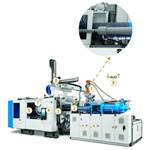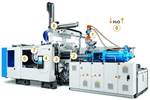"Think in Plastic, Not Steel" Presentation Challenges Moldmakers
This “townhall” presentation, based on MoldMaking Technology’s monthly Pellet-2-Part (P2P) article series, challenged attendees to consider modernizing their current approach to mold manufacturing by gaining a greater understanding of the plastic injection molding process.
Rich Oles of ROI, Inc. asked attendees, "Do you want your moldmaking to add more value?" "Do you want to solve or improve plastic injection molding problems?" He then said, "If you answered yes to either of these questions, then try thinking in plastic first, not steel." Rich emphasized this strategy by reviewing some daily processing challenges and presenting a few permanent solutions.
Rich began by defining a mold, which he says is nothing more than a heat exchanger. "A heat exchanger is a piece of equipment built for efficient heat transfer from one medium to another.” As a moldmaker it's your job to build the best heat exchanger possible within an agreed budget of time and money. However, the focus isn’t the time or budget, but the key measures and engineering features that define the budget of time and money. Other discussion points included melt condition and what the melt contacts as it is converted from a pellet to a part, engineering a mold and how too little or too much will result in little or no ROI, thermal diffusivity and water systems.
He then focused on the importance of teamwork, explaining that no one is the subject matter expert at everything. It is key to build a culture that fosters listening, learning, mentoring and teaching. Don’t accept “This is how we've always done it.” And remember to focus on the ‘KISS’ culture and know your suppliers.
This ties into perception, communication and execution. The way we all perceive a problem has everything to do with root cause problem solving. How we communicate the plan (based on our perception) is key. A successful execution of the plan relies on delegation, collaboration and personal contribution (in specific, defined roles). The effectiveness of the plan depends heavily on the accuracy of the initial root cause perception.
Finally, he explained that the keys to problem solving mold issues start with understanding component integrity, over-injection or over-molding, the nozzle tip, nozzle heat, gate insert, etc., color change, water leaks and controlling energy.
To hear more from Rich, check out his Pellet 2 Part (P2P) column in every issue of MoldMaking Technology.
Related Content
-
What You Should Consider When Purchasing Modified P20 Steel
When buying P20 steels that have been modified, moldmakers must be aware of the variations and key issues that affect delivery, cost and lead times.
-
Corrosion-Resistant, Highly Machinable Tool Steel
Opticut mold steels from Swiss Steel Group member Deutsche Edelstahlwerke apply a novel treatment to the material to eliminate the deterioration caused by the addition of sulfur.
-
Corrosion-Resistant, High-Hardness Mold Steel for Optimal Surface Finishes
Uddeholm’s premium Tyrax ESR can reduce polishing time by 40-50% and is suitable for long run production molds and high-performance plastics.







.jpg;maxWidth=300;quality=90)

_300x250 4.png;maxWidth=300;quality=90)





